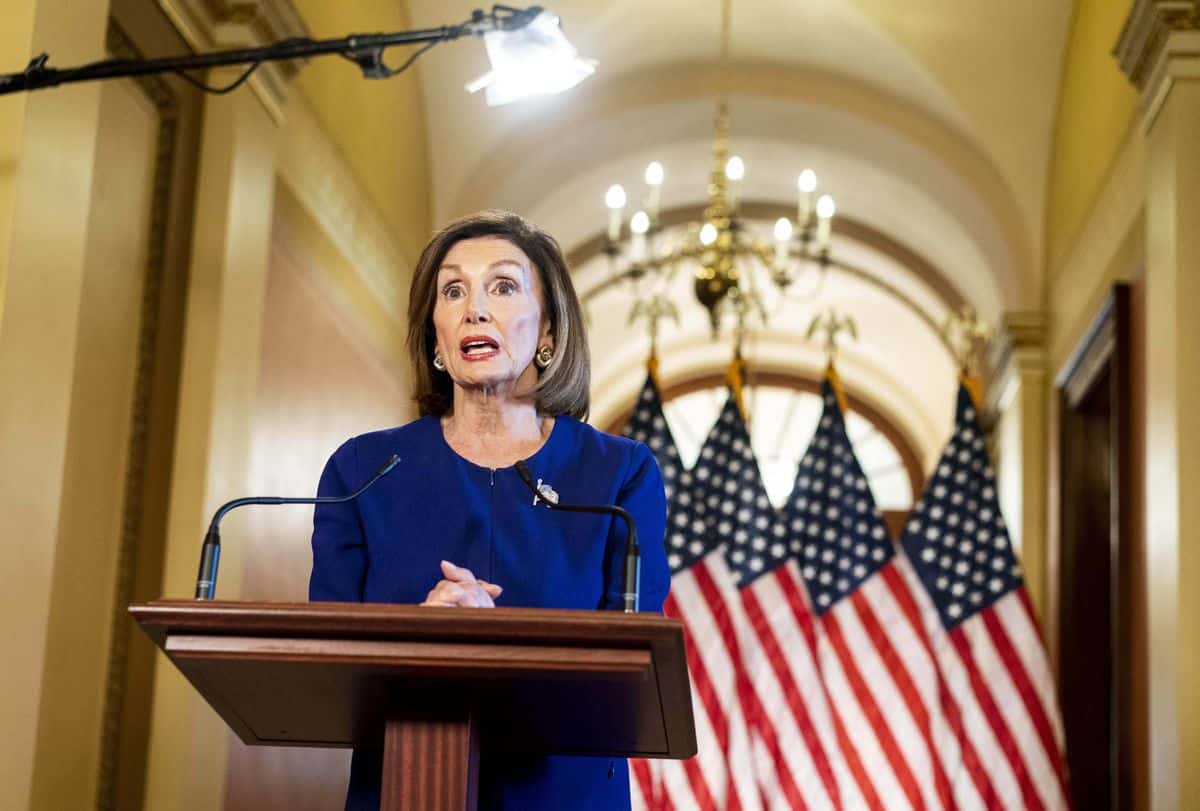In the end, a vote in the House of Representatives, on Thursday, to move ahead with public impeachment proceedings against Donald Trump was probably as inevitable as it was historic. When the Democrats retook control of the House last November, the impeachment of this most polarizing of Presidents went from an impossibility to a likelihood. Trump has flouted constitutional norms from the start of his tenure and practically dared his critics to take the step of impeaching him. Now they are doing so. Elections do indeed have consequences.
Members of the House marked the moment with typical rhetorical excess, bombastic silliness, and florid invocations of the Founding Fathers. No doubt the silliest of all was the large red poster of Red Square that Steve Scalise, the Republican whip, brought to the floor, complaining of “37 Days of Soviet-style Impeachment Proceedings.” (Never mind that the Soviets did not have impeachment proceedings; they preferred a bullet to the head or a life sentence to the Gulag.) Speaker Nancy Pelosi spoke of Benjamin Franklin; the House Minority Leader, Kevin McCarthy, countered with Alexander Hamilton. But it was a hollow exercise, and everyone knew it. This was no debate, there were no fence-sitting members to persuade, and there was not much point to the talking, anyway: the warring factions would vote just as expected—Democrats for, Republicans against.
By the time the tally was final, right after 11:30 a.m. on a rainy Halloween morning, only two Democrats had voted not to proceed with impeachment, and one former Republican, Justin Amash—having quit the Party earlier this year after turning on Trump—had voted in favor. “Excusing his misbehavior will forever tarnish your name,” Amash lectured his former G.O.P. colleagues, in a tweet before the vote. Every single one of them ignored him anyway and stuck with the Party line. For Trump, this is what counts as a win at the moment. “I didn’t have one negative Republican vote, which is a very unusual thing,” the President said soon afterward. “Not one negative Republican vote.”
Beyond the predictable partisanship, process votes like these tend to emphasize the highly situational morality of Congress, where might makes right and she who has the power makes the rules. For Republicans, it was a moment to point out the hypocrisy of Democrats who, two decades ago, complained of the partisan impeachment of President Bill Clinton and to note, as McCarthy did, that Pelosi herself had promised, only a few months ago, not to proceed with impeachment against Trump unless it was supported by members in both parties. McCarthy had a point. But so did Pelosi. For days, Republicans had been demanding a House floor vote, clearly defined rules of the road, and public hearings. Pelosi gave all of that to them, showing, in the process, that they were now against the very things they had insisted upon. Luckily, the Constitution says nothing that constrains the eternal right of politicians to change their minds.
The extreme polarization reflected in Thursday’s vote was not a new phenomenon, after all, but a signal fact of the political moment. So far, the revelations about Trump and Ukraine, just like the revelations of all his previous scandals, have had no significant impact on how Americans think of him. Approximately forty per cent of Americans support Trump today, according to polls; approximately forty per cent of Americans supported him a year ago, and a year before that. And yet something has changed with Pelosi’s determination to proceed. President Barack Obama used to tell his aides, “Let’s not just admire the problem,” urging them at least to try to do something about the intractable messes that invariably landed on his desk. The House majority under Pelosi has stopped admiring the problem of Trump and has decided to do something about it. They are acting, for better or for worse, despite the polls and not because of them.
In her speech before the vote, the Speaker said that she hoped Thursday’s resolution and the upcoming public hearings that it authorized would bring “clarity of purpose, the clarity of procedure, a clarity of fact” to the House’s probe of President Trump’s pressure campaign on Ukraine to launch investigations that would benefit him personally. Interestingly, this is exactly what the President says that he welcomes. On Monday, Trump, undercutting the railing by Republicans about the unfairness of the process, said that he’d actually prefer to start arguing the merits of his own actions. “I’d rather go into the details of the case rather than process,” Trump told reporters, before flying to Chicago, where he proceeded to claim that the Democratic-run city was more dangerous than Afghanistan. “But I think you ought to look at the case. And the case is very simple. It’s quick. It’s so quick.”
Trump’s closest aides have already taken him up on this. In the alternate-reality world in which partisan loyalties are more important than factual niceties, the President’s actions are not just defensible—they are great, terrific, “fantastic,” as the Secretary of State, Mike Pompeo, told Fox News on Wednesday. It is not enough to refrain from criticizing that which is criticizable; you are required to praise it. Trump says that his July 25th phone call with the Ukrainian President, Volodymyr Zelensky, which set off the alarm bells among his own national-security staff, was “perfect.” He wants his defenders to agree and to do so publicly. But Republican members of Congress have largely declined to follow Trump’s instructions. In the House debate on Wednesday, there was lots of discussion about how unfair the Democratic rules for the investigation are, but almost no one claimed that it’s just fine for the President to pressure a foreign leader to investigate his political rivals. No one said that the call was “perfect,” no matter how many times Trump has asked them to. Over on the Senate side, the Republican members have simply been refusing to comment, either dodging reporters or offering endless non-answers citing their status as potential future jurors.
Trump, however, is arguably right about the straightforward nature of the case. It’s just that all of the evidence and testimony so far has tended to be damaging to him, including his own words. None of it has been exculpatory. A parade of current and former Trump Administration officials has laid out, in clinical detail, how Trump and his personal lawyer, Rudy Giuliani, hijacked America’s policy toward Ukraine. In just the past few days, particularly dramatic and explicit revelations that bear directly on Trump’s personal role have emerged. On Tuesday, Lieutenant Colonel Alexander Vindman showed up on Capitol Hill, in full-dress uniform, and told House impeachment investigators of both his alarm while listening to Trump’s call with Zelensky and his immediate determination to report it to White House lawyers. Vindman, the National Security Council expert on Ukraine, wrote in his prepared statement, “I was concerned by the call. I did not think it was proper to demand that a foreign government investigate a U.S. citizen, and I was worried about the implications for the U.S. government’s support of Ukraine.” This was not hearsay but specific and credible testimony directly linked to the President. On Wednesday, Deputy Secretary of State John Sullivan testified in a televised Senate confirmation hearing that Trump fired the U.S. Ambassador to Ukraine at Giuliani’s behest. Also on Wednesday, Catherine Croft, a State Department official, told House investigators that the U.S. officials overseeing American policy toward Ukraine were informed that Trump personally held up nearly four hundred million dollars in military aid. “The only reason given was that the order came at the direction of the President,” Croft testified. On Thursday, even as the House was voting to proceed with the impeachment, the N.S.C.’s senior director for Russia and Ukraine, Tim Morrison, testified that he, too, had raised contemporaneous concerns about the conditioning of military aid for Ukraine and about a meeting with Trump, which the President demanded, on the launch of the investigations.
All of that is just from the past few days, which is the other signal fact of life in the Trump era: it is exhausting and overwhelming and so filled with outrage and revelation that it’s hard to remember events beyond a news cycle or two, no matter how significant or striking. Remember the death of Abu Bakr al-Baghdadi, the world’s most-wanted terrorist? That was only announced by Trump to the world on Sunday. In other times, the news would still be exclusively concerned with this development, after years in which Baghdadi’s Islamic State wreaked death and mayhem not only across a wide swath of Iraq and Syria but also via isis-inspired terrorist attacks in Europe and the United States. Surely, the Trumpian flourish that led the President to apparently make up his account of Baghdadi “whimpering” and “crying” as he died is not something that should be easily forgotten.
Trump himself has clearly not forgotten, even if the rest of us are having a hard time remembering. On Wednesday night, in the middle of Game Seven of the World Series, the President’s campaign ran an ad that somehow managed to mash it all together, attacking the Democrats for impeachment while touting his “obliteration” of Baghdadi and the Islamic State. The ad, I thought, was a true reflection of the Trump of 2019: angry, defensive, a literal killer. It is a dark, menacing ad, for a dark, menacing time. At any other moment, the linkage between the domestic political fight over impeachment and the actual war against the Islamic State would seem bizarre and inappropriate. But not at this moment. In Trump’s world, the linkage is simple: it’s all about him. So is the ad, which sells his divisive personality as the rationale for his reëlection. This is precisely the case that President Trump will make to the members of Congress who must consider the impeachment charges against him in the coming months, and it is the case that he will make to voters next November. “He’s no Mr. Nice Guy,” the ad admits, but so what? “Sometimes it takes a Donald Trump to change Washington.” In this case, the President is absolutely right. Washington is different than it was before. There is no going back.
By Susan B. Glasser, The New Yorker
From the Speaker’s Balcony hallway, Speaker of the House Nancy Pelosi, D-Calif., delivers a speech concerning a formal impeachment inquiry into President Donald Trump on Tuesday, Sept. 24, 2019. (Washington Post photo by Melina Mara)
Redazione
La redazione di Babilon è composta da giovani giornalisti, analisti e ricercatori attenti alle dinamiche mondiali. Il nostro obiettivo è rendere più comprensibile la geopolitica a tutti i tipi di lettori.
L’evoluzione dei sanitari a terra: design moderni e materiali innovativi per una scelta sempre più popolare
23 Dic 2024
Quando si parla di design di interni e arredamento sono tantissimi i fattori che entrano in gioco. Ciascuno di noi ha…
Se le questioni di genere dettano le agende di politica estera
19 Dic 2024
Il perseguimento di politiche identitarie da parte dell'establishment della politica estera occidentale sta portando a…
Dall’origine straniera all’icona americana: il fenomeno dello sport negli Usa
14 Mar 2024
Molti sport americani sono accomunati da un aspetto particolarmente curioso: raramente sono davvero nati sul suolo…
Roulette europea, francese o americana? Ecco un approfondimento
22 Set 2023
La roulette è un classico intramontabile dei casinò, amata da milioni di appassionati in tutto il mondo. Una delle…




